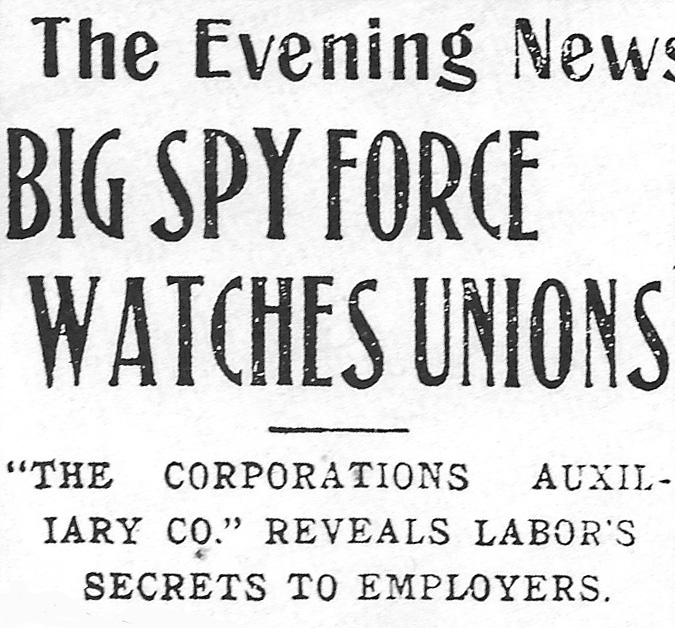
“If I worked in a factory, the first thing I would do would be to JOIN A UNION.”
President Franklin Delano Roosevelt, from a CIO organizing poster (circa 1930)
"Today in America, unions have a secure place in our industrial life. Only a handful of reactionaries harbor the ugly thought of breaking unions and depriving working men and women of the right to join the union of their choice. I have no use for those -- regardless of their political party -- who hold some vain and foolish dream of spinning the clock back to days when organized labor was huddled, almost as a hapless mass. Only a fool would try to deprive working men and women of the right to join the union of their choice."
President Dwight D. Eisenhower, 1952
The choices highlighted in the Ford organizing campaign billboard are still with us today. The benefits of the Union Shop were at the heart of the unsuccessful 2012 ballot proposal to incorporate the rights to collective bargaining into the Michigan Constitution. Its opponents, who later enacted “Right to Work” laws, echoed the arguments made almost a century ago by Open Shop advocates like auto pioneer Henry Leland. The terms of the social contract between managers and workers have been contested for almost a century and a half with Southwest Detroit at center stage on many occasions.
It's worth recalling that in 1883 the first annual report of the Michigan Bureau of Labor and Industrial Statistics decried the use of child labor in Southwest Detroit brickyards. Mothers toiled from sunrise to sunset for meager wages that allowed them to live only in “filthy, dilapidated, little hovels” opening onto muddy alleyways. In the face of desperate circumstances such as these, who was able give voice to those who were disenfranchised? What forms of organization best served the interests of workers and the unemployed? How were the political and community alliances forged to advance the banner of social justice?
For many, the answer was the union. While unions had been present in the city throughout much of the 19th century, they became more prominent in the era of industrial expansion following the Civil War. The Knights of Labor strike at one of the city’s largest employers, Michigan Car Works (a firm that later merged with American Car & Foundry), was a focal point of the unsuccessful 1886 citywide campaign to win an eight-hour day. Despite that setback, in the decades that followed bargaining with companies under the auspices of the American Federation of Labor took root and government was pushed to address the worst workplace abuses and substandard living conditions.
Most accounts of the origins of Detroit’s auto industry highlight the role of entrepreneurs, financiers, and inventors associated with the city’s metalworking establishments that benefitted from relatively easy access to key raw materials via rail routes and waterways. What is often left out of those narratives is that the city’s business leaders championed Detroit as the nation’s premiere Open Shop town, having undercut the influence of the city’s craft unions in a campaign during the 20th century’s first decade.

In the Open Shop era, auto work was grueling. Even in the boom years of the 1920s, there was little stability associated with the work in auto industry. Foremen decided who got hired and who got fired. Following unpaid seasonal layoffs, there was no guarantee that a job would be waiting for any worker when production resumed in the next model year. While some of the most skilled workers were able to afford a home and raise a family, working Detroit was still a city mainly of single men. Many lived in crowded apartments and shared beds, sleeping in shifts.
As the Great Depression took hold in the early 1930s and hundreds of thousands left the city to find work, what little hiring took place was often described as “cattle calls.” Little wonder that workers didn't appreciate the “humane management” associated with the Union Shop conditions referred to in the Ford organizing campaign billboard. In such shops, unions could establish rights based on seniority. They could address dangerous working conditions, and the speedup. In the right circumstances they could win increases in pay and benefits. Not that it was easy — considerable risk and sacrifice was required of those who built the union and transformed Detroit from the citadel of the Open Shop into a Union Town.
TEXT – DAVID ELSILA, Treasurer - Michigan Labor History Society / Former editor UAW “Solidarity” magazine
Click to view:
“Dreaming of a Better Future”, an essay written for the dedication of Transcending, the Labor’s Legacy Landmark public art space at Hart Plaza to learn more about the Michigan Labor History Society’s view of the contributions made by organized labor.
The Michigan Labor History Society’s website, MLHS supported some of the earliest planning for the Guide. The complete Transcending dedication booklet, the “Exploring Our Roots” classroom wall map poster, and copies of its newsletters can be downloaded free here.
Labor Roots, the page of the Guide that provides easy access to all labor history posts of interest to union and community activists, students, and scholars.
PHOTO CREDITS
Walter P. Reuther Library, Archives of Labor and Urban Affairs, Wayne State University
UAW Billboard
CONSIDERATIONS
The addition of David’s MLHS involvement and Solidarity editorship here represents a departure from the convention used in other pages where we don’t discuss the background of the person responsible for the post, as that information appears on a page where bios appear for Team Members and Guest Contributors.



